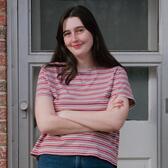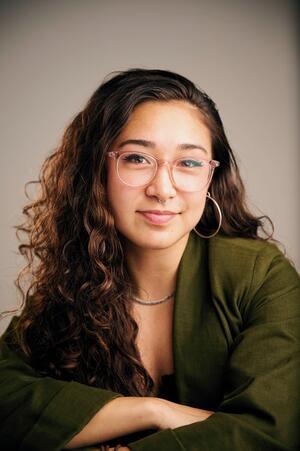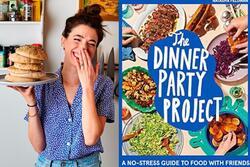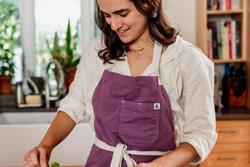7 Questions For Food Blogger Alana Chandler
JWA chats with food blogger and recipe developer Alana Chandler.
JWA: When did you discover your love of baking?
Alana Chandler: My tenured friendship with baking began so long ago that it’s a bit hard for me to pinpoint when It All Began! At the very foundation, the grounds upon which this companionship sprouted were fertile because of my love for textures. Something about kneading dough, melting powders into syrups, crushing crackers with palms, squeezing pulp out of lemons — baking becomes a visceral, meditative endeavor. Inviting all five senses to dance with the ingredients, baking has been my artistic coping mechanism. Baking allows me to temporarily fall into primordial sensation and wonder. How did that blobby pale dough turn into this expansive golden loaf of bread? The choir of yeast bubbling away melodies through hot air, neighbors to gluten proteins outstretching their arms to embrace sugars caramelizing. It’s a huge privilege to have the material means to engage in such a hobby; seeing the act of baking as a form of generative expression and spiritual nourishment relies on having food security, often excess. The best part of baking is sharing.
I leaned into baking in high school. My American history class was offering some sort of extra credit, which prompted me to make a cake decorated with red fondant and a yellow sickle to represent the Soviet Union flag, with an interior that revealed the American flag when sliced. While I don’t remember the prompt that inspired such a cake, what I do remember is that making the fondant from scratch required mixing melted marshmallows with powdered sugar and so much food coloring that my hands were stained blood red for days. For some reason, coming into high school with those murderous palms wasn’t against the high school dress code, but wearing jean shorts was! Fortunately, loitering between classes to sell my homemade granola and cookies was also allowed. My freshman year, friends in my lunch period motivated me to start @chow.by.chikamatsu to share my kitchen experiments. And thus, my first-born (my Instagram baking blog) came to be.
JWA: Your blog highlights delicious plant-based recipes. Are there any common misconceptions about vegan cooking that you want to debunk?
AC: A common misconception about vegan food is that it tastes akin to a collaboration-gone-wrong of Grass x Bird Food. To debunk this myth, I’d like to employ the metaphor of a potato. Potatoes are dear to many of our hearts, be they fried, mashed, or roasted. But no one really eats a potato raw, biting into it like an apple. What I’m trying to emphasize here is that vegan cooking—or all of cooking for that matter—is about knowing what ingredients to acquaint with one another to elevate an otherwise bland food into an edible masterpiece! It’s a skill truly everyone can cultivate.
For those wondering where to begin, it can be daunting when traditional pastries rely on rich and very non-vegan ingredients like cream and eggs. One-to-one plant-based substitutes like vegan milk or butter can be expensive and hard to find depending on where you live, but with the blessing (curse?) of the internet, apt substitutions are only a Google search away. Or make your own rogue replacements with some trial and error! The liquid from canned beans can be whipped up to make a vegan meringue that doesn’t use egg whites. Tahini (sesame paste) or silken tofu can be used to make savory dishes creamier. Cream from a can of full-fat coconut milk can transform into a banging whipped cream. Bird food could NEVER!
JWA: You also highlight Japanese-Jewish fusion recipes, including matcha sesame babka and halva butter mochi. How does baking connect you to both of these facets of your identity, and are there any similarities between the significance of food in both cultures?
AC: I’m not saying anything new when I say: food is personal, communal, historical, political—more than what a line of text can fit. Food is the nourishment necessary to sustain life, and its very necessity is what allows it to brush shoulders with all aspects of the human experience. Food and culture are bound together at the hip. As a Japanese-American Jew who used to struggle with feeling like a watered-down version of my familial heritages, I’ve found empowerment in crafting my own traditions — recipes as food rituals. As I’ve written in my fusion recipe for warabi mochi-inspired Hanukkah donuts, “It brings me inexplicable joy to combine and share my cultures through fusion food, embracing the exhilaration of recipe experimentation and creating a symbolic manifestation, albeit utopic, of cross-cultural unity I hope to foster.”
JWA: Are there other places in your life where you are able to “fuse” your Japanese and Jewish identities?
AC: Identity is a funny little thing. A funny big thing. Without falling too deep into that philosophical wormhole, I would say that the ways in which being Japanese and Ashkenazi merge in my life are just as much being “American” mixes with “Youtube addict,” or being a “doodler” fuses with “loving moss” (True “fun” facts about yours truly). We all exist at various intersections and liminalities; we are shaped by the convolution of innumerable kaleidoscopic facets that it’s difficult to detangle the discrete influence of individual elements. Getting back to the question, my answer is, let’s talk in person. For the unsatisfied reader, I can admit that I wish for a genre of music that marries klezmer with enka, a type of traditional Japanese music. Both incorporate beautiful harmonic minor scales. Once Spotify drops that playlist, I foresee all Japanese Jews across the poles of Earth becoming magnetically bound, merging into one mega-soul, and ascending to heaven, as predicted in the Book of Genesis.
JWA: Tell us about your involvement with Tlaim: A Patchwork Cookbook.
AC: Tlaim: The Patchwork Cookbook is a grassroots, community cookbook project that aims to celebrate the racial and ethnic diversity within the global Jewish community. Supported by Be’Chol Lashon as a nonprofit endeavor, Tlaim honors and amplifies the myriad recipes and food traditions that have historically been excluded from Western Jewish institutional spaces. Thus far, Tlaim has released a Passover zine, containing a mosaic of Pesach recipes which can be found on our website. We're still seeking recipe submissions, so please consider submitting! Any questions can be directed to our email, and you can learn more by following our Instagram.
JWA: Do you have any advice for folks looking to improve their home baking skills?
AC: I can recommend how I learned best: watching how-to baking videos on Youtube and getting any questions answered on Reddit. Instagram is also lush with bakers that inspire me with their vibrant ingenuity. As of now, I’m in love with @itsholly for her divine intuition in combining fascinating textures and flavors, @the_bananadiaries and @the_domesticgothess for staple vegan desserts, @blackforager for cooking techniques using foraged plants and fungi, @chez.jorge and @itslizmiu for vegan Asian cuisine, @black.nutritionist for decolonial nutrition education, and @littlefatboyfrankie for dreamy fusion recipes and food photography.
JWA: Lastly: what is your comfort meal?
AC: My mom’s fried tofu karaage (marinated in soy sauce, sesame oil, mirin, and ginger) on top of a bed of brown rice with a side of broccoli. I am a broccoli obsessive. My high school yearbook quote was “brocc-and-roll.” Brussels sprouts crisped up in the oven are a close second. Mushrooms and a can of lima beans sauteed in garlic, Carolina Reaper chili powder, lemon, and olive oil never fail. Seventy-percent+ dark chocolate and kettle corn warm my heart. So does a good cup of jasmine tea.







